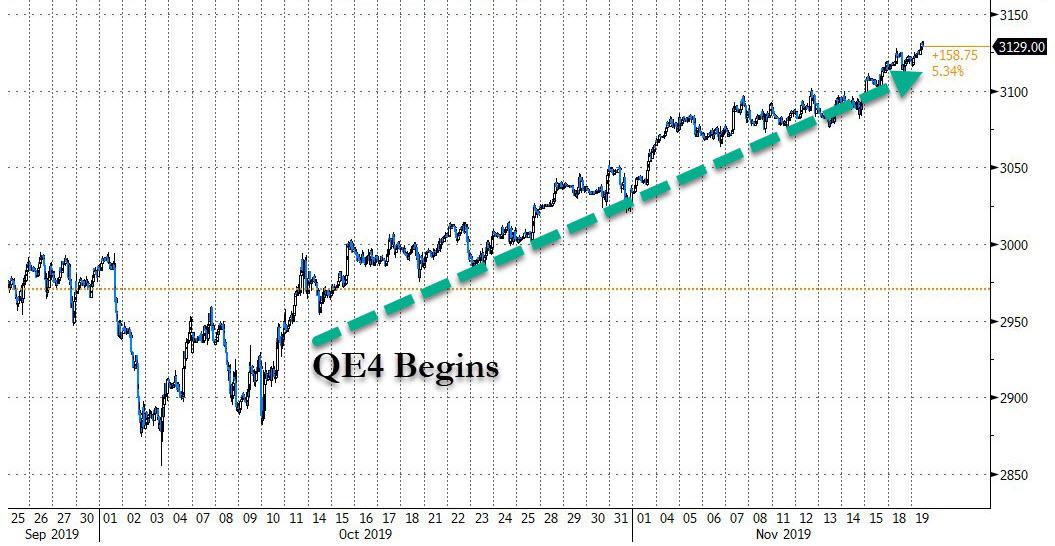"Damned if we do, damned if we don't.. pass me a penny.. "
The global markets continues to wobble along. Trade deal or no deal..? Lots of talking heads saying it might happen, it might not, the potential credibility costs if its not. Meanwhile, all eyes on Hong Kong to see how the current university standoff plays out. The Chinese upped the ante this morning: – China attacks Hong Kong ruling to overturn Mask Ban. (Slightly concerned to read HSBC has apparently reacted to Chinese pressure and closed down accounts related to the protest movement.)
Fed Vs Trump
I would have loved to have been a fly on the wall at yesterday's confrontation meeting at the White House between Donald Trump and Fed Head Jerome Powell. They apparently had a convivial 30-minute chat where Trump lambasted, laid out his concerns the US is putting itself at a competitive disadvantage in terms of higher interest rates and a strong dollar. These factors have failed to fuel inflation and heightened trade tensions with EU and China. Trump protested his view US rates should be lower than competitors because, er, the US is the US.
At my meeting with Jay Powell this morning, I protested fact that our Fed Rate is set too high relative to the interest rates of other competitor countries. In fact, our rates should be lower than all others (we are the U.S.). Too strong a Dollar hurting manufacturers & growth!
Its an interesting take on economics. Low rates typically mean a weak economy. But, you can see Trump's perspective – if money to invest is cheap and abundantly available, then it stands to reason entrepreneurs should be borrowing loads to invest in new plant. But reason is precious and rare commodity. When working out the value of any investment, low rates and higher relative returns elsewhere mitigate against risky new ventures and towards available financial assets – for instance; stock markets. That's the brutal reality of the last 10 years – all that lovely money central banks created through QE, that was supposed to fuel growth through economic multiplier effects, got sucked into the stock market swamp.
You live and learn... It makes me wonder where all the current liquidity the Fed is pumping into the short-end – which definitely isn't QE except that in just about every way it is – is going? Weaker dollar? Yeah, but, Europe and Japan are also pushing the Yen and Euro lower.

Powell apparently stood his ground in front of Trump – making clear Fed policy will depend entirely on what the releases and data show in terms of the economic outlook. According to the WSJ, Powell told Trump rate decision are: "based solely on careful, objective and non-political analysis." How the Fed reacts to slowing growth, or the risks that tying themselves to low rates will leave the cupboard empty if a real crisis develops, are for the Fed to determine.
Based on Trump's previous form I would predict we'll be seeing the Trump-Fed twitter stream ramp up negativity on the Fed's decision making in coming months, seeking to pin blame on the Fed for any downturn, and seeking to juice the economy ahead of the Nov 2020 election. Trump clearly perceives Powell as a disappointment – he appointed him to the post, and expects Powell to support him. How dare the fellow go against him… as he said last year: "I'm not even a little bit happy with my selection of Jay."
The issue of Fed vs President is not going away – while the market broadly believes Powell's and the Fed's independence is sacrosanct, and Trump can't sack him, it damages the credibility of the Presidency that Trump still tries to bully the Fed. But – critically - it shouldn't have that much effect on markets, because we all know that's just the way it is...
Meanwhile… back in Blighty
Joy oh Joy.. Tonight we get a televised debate between the two most unelectable men ever to contest the UK premiership. I can't wait… to catch up on something else instead on Netflix. The big issue is where will Sterling go? Up on a clean Brexit! Down on further uncertainty! What are we likely to get?
The problem is… this election is turning into a chancy coin toss between government and ongoing chaos. It is not providing any positive signals for our future prosperity.
Current election odds say:
- 2/5 Conservative Majority
- 5/1 Labour Minority
- 8/1 Conservative Minority
- 18/1 Lib/Lab/SNP Pact
- 20/1 Lab/SNP Pact
- 25/1 Labour Majority
These are profoundly unsettling numbers. They basically say there is a 56% chance the UK is going to get another weak and divided government. What the UK needs most desperately is leadership – a government with a working majority. A Conservative minority will be unworkable. A Labour minority will be forced to concede too much to do much – and Brexzit will drag on and on and on and on and on… Coalitions are dangerous for the UK. The SNP will demand an independence referendum – and could even win it. The very worst result would be a second Brexzit referendum which looks to be about a 47% chance of happening according to these odds – it will just ensure the UK remains fraxious, rudderless and distracted for years to come..
And the issue is.. we still have 24 days of this hell to go through. Please make it stop!

Commenti
Posta un commento